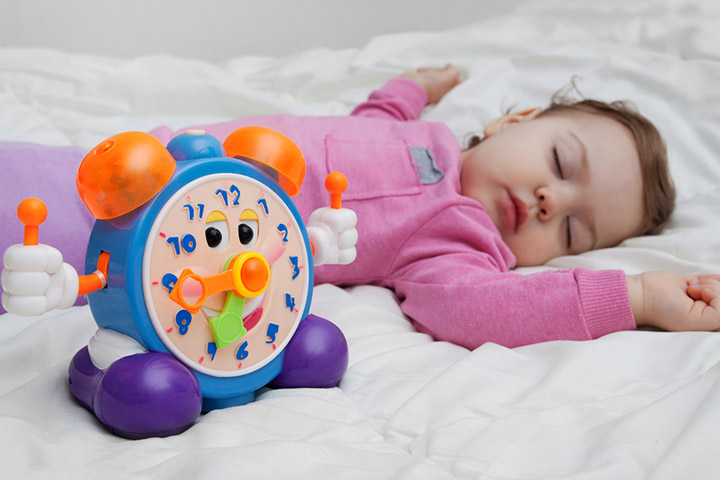You notice your baby scratching their eyes and nose, becoming irritable and fussy, and you realize it’s time for them to go to bed. So, you gently rock them in your arms and even hum a lullaby to them. But does your baby fight sleep despite the rocking?
Some babies can resist falling asleep when placed in a crib. You carefully set them in their crib, only to turn around and hear them wail and kick. You must be curious as to what leads to such a situation. Read on to learn why your infant is having trouble sleeping and how to put an end to it.
How To Know If Your Baby Is Fighting Sleep?
Some babies resist falling asleep, even when they are tired or exhausted. Such babies arch their backs, fuss, squirm and kick to ward off sleep, leaving them irritated and fussy. Babies who fight sleep might also find it hard to go back to sleep once they wake up during the night.
Possible Reasons For Babies To Fight Sleep
Finding out why your baby is fighting sleep is important to help them sleep better. Here are a few possible reasons.
- Too tired: Babies sleep faster when tired, but if they are too tired, it could lead to sleep resistance and unrest. It is said that babies have a window in which they are most likely to fall asleep; when that is missed, they might become overtired, irritable, and resist falling asleep, leading to exhaustion.
- Non-syncing bedtime and circadian rhythm: Studies suggest that babies with shorter intervals between DLMO(dim light melatoniniXA hormone produced in the brain in the darkness to induce sleep onset, which is a marker for circadian rhythm) and bedtime tend to show more resistance to sleep (1).
This usually happens when the baby’s circadian rhythm (biological clock) doesn’t sync with the bedtimes set by the parents. As a result, babies might show Sleep-onset latencyiXThe time taken by an individual to fall asleep from the state of awakening.
- No self-soothing: Research says that babies by the age of four to six months tend to develop self-soothing at sleep onset and begin to experience dream or nightmare awakenings, and this tendency increases in frequency until the age of one.
However, if your baby does not develop self-soothing, they might resist falling asleep without parental intervention (2).
- Changing sleep patterns: The time your baby sleeps changes as they grow older. For example, newborns need to sleep 14-17 hours, whereas babies aged four to 11 months need 12-15 hours of sleep (3) way to understand this change is by tracking their sleeping hours.
- Hunger: Newborns require feeding almost round the clock for the first few months to support their growth and nutritional requirements. If you skipped a feed or if the portion was less, it could leave your baby hungry, making them resist sleep. This also occurs if the baby’s nap time and feeding time collide. If you find your baby sucking their fingers and lips while resisting sleep, it might mean that the little one is hungry.
Rhianna, a mother, reveals her journey with her 19-month-old baby’s nighttime waking habits, “At 19 months, my kiddo had never slept through the night. He was still waking every two to four hours to nurse. There were times when this night-nursing frequency felt unbearable, but also times when it was decently manageable. We bedshare, and while I solidly credit this practice with strengthening our nursing relationship, I also quietly worried that our family bed set-up could be a giant stick in the spoke on our journey to ever sleeping through the night (i).”
- Over stimulation: Some babies might find it difficult to sleep or resist sleeping when they are over stimulated. This stimulus could be due to too much light, noises like snoring, or touch. For instance, when it is the holiday season, and your house is full of people, your baby could be fighting off sleep due to over stimulation.
- Separation anxiety: If your toddler always wants to be held or cries when left alone, even for a while, they might have separation anxiety. This is normal and is a part of their development. Babies usually develop separation anxiety at about six months of age. Separation anxiety could be the reason for your baby to wake up as soon as you lay them down in the crib (4).
Sometimes babies may also fight sleep if they have teething pain, cold, or ear infections, so it is best to look for other symptoms.
How To Stop Your Baby From Fighting Sleep?
If your baby is fighting sleep or waking up frequently, you may help them sleep better. Here are a few general tips to help your baby sleep.
- Create a bedtime routine and stick to it: Studies suggest that a bedtime routine is associated with positive mood and enhanced emotional-behavioral regulation in babies (5). If you put your baby to sleep at the same time every night, their biological clock will begin adjusting to it and may eventually help sync the sleep pattern with your baby’s circadian rhythm. Certified pediatric sleep consultant and baby sleep expert Cara Dumpalin of Taking Cara Babies says, “The best way to stick to a bedtime routine with a baby who fights sleep is to be mindful of their sleepy cues and wake windows. Finding that sweet spot bedtime allows your baby to have enough awake time to be prepared for sleep without pushing them to get overtired.”
Observe healthy sleeping habits, such as giving a bath, feeding them, and reading a bedtime story, for establishing a bedtime routine. Also, make sure you place your baby on their back, which is the safest sleep position until they turn one.
- Check daytime naps: Let your baby have adequate naps in the day so that they do not fight sleep before bedtime at night. Babies between two and 12 months of age usually nap about two to five hours during the daytime (6). Adjust the naps as per the baby’s requirements and ensure they have the chance to snooze off. Try maintaining a gap of about four hours between the last nap of the day and bedtime at night.
- Pick up the sleep cues: A sleepy and tired baby gives out signs, such as yawning, rubbing their eyes, or losing interest in play that indicate sleep readiness. It is best to put them to sleep within minutes to avoid losing out the window of sleep.
- Set boundaries: Set a limit to how much you comfort the baby when they wake up at night and fight sleep. Usually, when babies cry at night, parents rush to hug, cradle, and soothe them until they slip into a deep slumber. This might become a habit for the baby, and they might resist falling asleep on their own.
Next time when your child starts to cry, go into their room to make them feel secure, but do not immediately take them into your arms. Try to soothe them in their crib. Alternatively,you can place the baby’s crib in your room (room-sharing). It allows the baby to have a glimpse of the parent and soothe them self back to sleep.
- Manage separation anxiety: If you spot signs of separation anxiety in your children, then try to establish a routine to make them feel secure on their own.Place a security or comfort toy away from the baby’s reach but within their line of sight. Leave your baby in the room for shorter periods while supervising them from afar.
- Break dependency sleep habits: If your baby has the habit of falling asleep in your arms, then they might wake up as soon as you set them in the crib. To avoid this, put your baby in the crib when they show signs of drowsiness but are not in an asleep state. This gives them time to adjust to the crib. If your baby is habituated to sleeping in your arms, it might take a lot of patience and effort to break the habit.
- Create a soothing environment: Let the atmosphere in the room be calm and relaxing. Eliminate loud noises, screens, and any rough external stimuli at least one to two hours before sleep. You may also use blackout curtains and white noise machines to soothe your baby.
- Help establish circadian rhythms: The first signs of circadian rhythms develop ten to twelve weeks from birth, marked by an increase in sleep during the night (3). During this period, train your baby’s body to establish a daytime and a nighttime schedule by playing, interacting, exposing them to sunlight in the morning and afternoon, and being less active during the night.
- Feed them adequately: Newborns tend to feed for every two to three hours, and the intervals might increase as they grow. Make sure your baby’s tummy is full before bedtime.Also, take care that their feeding and sleeping schedules do not overlap.
- Be patient: If you are trying a particular method to make the baby fall asleep, do not give up. Work on it patiently until the baby no longer fights sleep. Take the help of family and friends in making the baby sleep better.
- Be emotionally available: It is important to make the baby feel secure throughout the day. Many babies, especially the older ones who don’t get to see their parents often, try to ward off sleep so that they can spend more time with them.
- Don’t push it: If you try to force your baby into going off to sleep, it usually makes them more excitable. The ensuing conflict will ensure that the baby does not go off to sleep.
It can be challenging for parents when their baby fights sleep. Some signs that your baby is resisting sleep are that they seem tired but refuse to fall asleep, and they squirm, arch their back, and kick the air to stop themselves from sleeping. Babies may do this because they are too tired, do not know how to self-soothe, have separation anxiety, or have been overstimulated. However, you can help your baby overcome this habit by sticking to a bedtime routine, watching for sleep cues, and creating a soothing environment. With time, your baby will be able to break this habit and sleep peacefully.
Key Pointers
- If your baby is fighting sleep even though they are sleepy, you will notice them fussy and irritated.
- They may be fighting sleep if they are too tired, not self-soothed, hungry, or have separation anxiety.
- You can stop your baby from fighting sleep by creating a bedtime routine, setting boundaries, breaking dependency, and providing a soothing environment.
If your child begins to cry every time you put them down for a nap then this video is for you. Learn what is causing this to happen and how you can soothe your child and help them remain calm.















